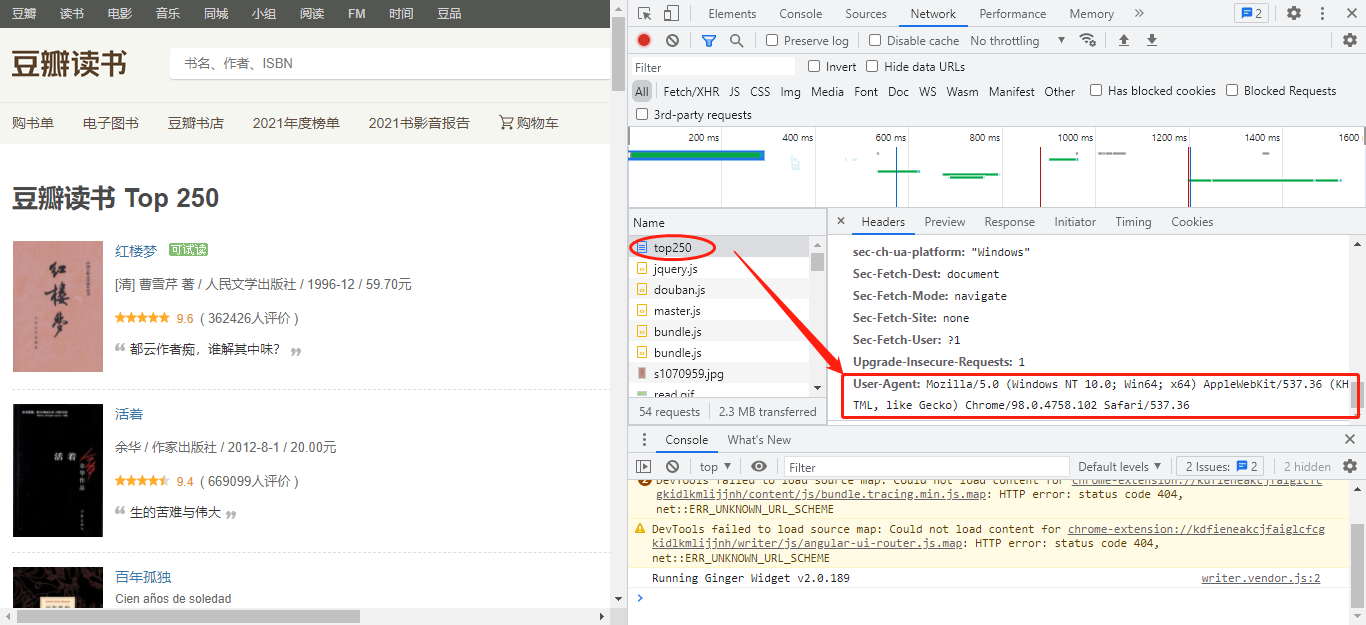从爬取一页数据到爬取所有数据

先说一下静态网页爬虫的大概流程
- 数据加载方式
- 通过点击第二页发现,网站后面多了 ?start=25 字段
- 这部分被称为 查询字符串,查询字符串作为用于搜索的参数或处理的数据传送给服务器处理,格式是 ?key1=value1&key2=value2。
- 我们多翻几页豆瓣读书的页面,观察一下网址的变化规律:
- 不难发现:第二页 start=25,第三页 start=50,第十页 start=225,而每页的书籍数量是 25。
- 因此 start 的计算公式为 start = 25 * (页码数 - 1)(25 为每页展示的数量)。
- 可以写一段代码自动生成所有所要查找的网页地址
-
 生成所有所需网页地址
生成所有所需网页地址1 url = 'https://book.douban.com/top250?start={}' 2 # num 从 0 开始因此不用再 -1 3 urls = [url.format(num * 25) for num in range(10)] 4 print(urls) 5 # 输出: 6 # [ 7 # 'https://book.douban.com/top250?start=0', 8 # 'https://book.douban.com/top250?start=25', 9 # 'https://book.douban.com/top250?start=50', 10 # 'https://book.douban.com/top250?start=75', 11 # 'https://book.douban.com/top250?start=100', 12 # 'https://book.douban.com/top250?start=125', 13 # 'https://book.douban.com/top250?start=150', 14 # 'https://book.douban.com/top250?start=175', 15 # 'https://book.douban.com/top250?start=200', 16 # 'https://book.douban.com/top250?start=225' 17 # ]
有了所有网页的链接后,我们就可以爬取整个网站的数据了

1 import requests 2 import time 3 from bs4 import BeautifulSoup 4 5 # 将获取豆瓣读书数据的代码封装成函数 6 def get_douban_books(url): 7 headers = { 8 'user-agent': 'Mozilla/5.0 (Macintosh; Intel Mac OS X 10_13_6) AppleWebKit/537.36 (KHTML, like Gecko) Chrome/76.0.3809.132 Safari/537.36' 9 } 10 res = requests.get(url, headers=headers) 11 soup = BeautifulSoup(res.text, 'html.parser') 12 items = soup.find_all('div', class_='pl2') 13 for i in items: 14 tag = i.find('a') 15 name = tag['title'] 16 link = tag['href'] 17 print(name, link) 18 19 url = 'https://book.douban.com/top250?start={}' 20 urls = [url.format(num * 25) for num in range(10)] 21 for item in urls: 22 get_douban_books(item) 23 # 暂停 1 秒防止访问太快被封 24 time.sleep(1)
反爬虫:限制频繁、非正常网页浏览
- 不管是浏览器还是爬虫,访问网站时都会带上一些信息用于身份识别。而这些信息都被存储在一个叫 请求头(request headers)的地方。
- 服务器会通过请求头里的信息来判别访问者的身份。请求头里的字段有很多,我们暂时只需了解 user-agent(用户代理)即可。user-agent 里包含了操作系统、浏览器类型、版本等信息,通过修改它我们就能成 功地伪装成浏览器。
 requests 的官方文档(http://cn.python-requests.org/zh_CN/latest/)
requests 的官方文档(http://cn.python-requests.org/zh_CN/latest/)
判别身份是最简单的一种反爬虫方式,我们也能通过一行代码,将爬虫伪装成浏览器轻易地绕过这个限制。所以,大部分网站还会进行 IP 限制 防止过于频繁的访问。
-
IP(Internet Protocol)全称互联网协议地址,意思是分配给用户上网使用的网际协议的设备的数字标签。你可以将 IP 地址理解为门牌号,我只要知道你家的门牌号就能找到你家。
- 当我们爬取大量数据时,如果我们不加以节制地访问目标网站,会使网站超负荷运转,一些个人小网站没什么反爬虫措施可能因此瘫痪。而大网站一般会限制你的访问频率,因为正常人是不会在 1s 内访问几十次甚至上百次网站的。
- 常使用 time.sleep() 来降低访问的频率
- 也可以使用代理来解决 IP 限制的问题 即通过别的 IP 访问网站
- 官方文档—— https://cn.python-requests.org/zh_CN/latest/user/advanced.html#proxies
-
1 import requests 2 3 proxies = { 4 "http": "http://10.10.1.10:3128", 5 "https": "http://10.10.1.10:1080", 6 } 7 8 requests.get("http://example.org", proxies=proxies)
在爬取大量数据时我们需要很多的 IP 用于切换。因此,我们需要建立一个 IP 代理池(列表),每次从中随机选择一个传给 proxies 参数。
我们来看一下如何实现:

1 import requests 2 import random 3 from bs4 import BeautifulSoup 4 5 def get_douban_books(url, proxies): 6 headers = { 7 'user-agent': 'Mozilla/5.0 (Macintosh; Intel Mac OS X 10_13_6) AppleWebKit/537.36 (KHTML, like Gecko) Chrome/76.0.3809.132 Safari/537.36' 8 } 9 # 使用代理爬取数据 10 res = requests.get(url, proxies=proxies, headers=headers) 11 soup = BeautifulSoup(res.text, 'html.parser') 12 items = soup.find_all('div', class_='pl2') 13 for i in items: 14 tag = i.find('a') 15 name = tag['title'] 16 link = tag['href'] 17 print(name, link) 18 19 url = 'https://book.douban.com/top250?start={}' 20 urls = [url.format(num * 25) for num in range(10)] 21 # IP 代理池(瞎写的并没有用) 22 proxies_list = [ 23 { 24 "http": "http://10.10.1.10:3128", 25 "https": "http://10.10.1.10:1080", 26 }, 27 { 28 "http": "http://10.10.1.11:3128", 29 "https": "http://10.10.1.11:1080", 30 }, 31 { 32 "http": "http://10.10.1.12:3128", 33 "https": "http://10.10.1.12:1080", 34 } 35 ] 36 for i in urls: 37 # 从 IP 代理池中随机选择一个 38 proxies = random.choice(proxies_list) 39 get_douban_books(i, proxies)
爬虫中的君子协议——robots.txt
robots.txt 是一种存放于网站根目录下的文本文件,用于告诉爬虫此网站中的哪些内容是不应被爬取的,哪些是可以被爬取的。
我们只要在网站域名后加上 /robots.txt 即可查看,
比如豆瓣读书的 robots.txt 地址是:https://book.douban.com/robots.txt。打开它后的内容如下:
1 User-agent: * 2 Disallow: /subject_search 3 Disallow: /search 4 Disallow: /new_subject 5 Disallow: /service/iframe 6 Disallow: /j/ 7 8 User-agent: Wandoujia Spider 9 Disallow: /
User-agent: * 表示针对所有爬虫(* 是通配符),接下来是符合该 user-agent 的爬虫要遵守的规则。比如 Disallow: /search 表示禁止爬取 /search 这个页面,其他同理。
